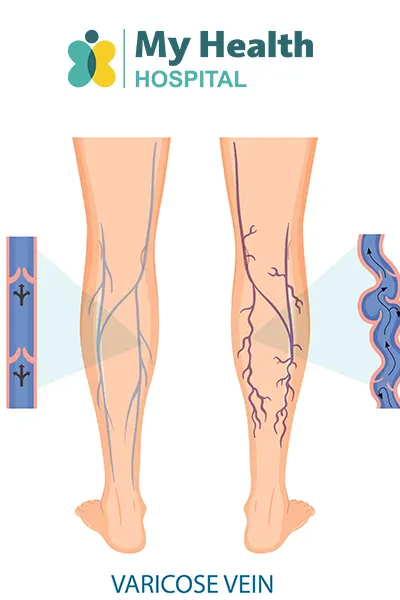-
 Mail us
Mail usinfo@myhealthhospitals.com
-
 Toll Free
Toll Free+91 9111674111
- Book Appointment
Vascular
Varicose veins are enlarged, twisted veins, often blue or dark purple, typically seen in the legs. They occur when vein valves malfunction, leading to blood pooling and vein bulging. If left untreated, this common condition can cause discomfort, swelling, and even pain. For those seeking effective relief, specialized varicose veins treatment in Kukatpally can help manage symptoms and prevent complications, using advanced techniques to restore healthy blood flow and improve overall vascular health.

Looking for effective varicose veins treatment near you in Kukatpally? Our expert specialists offer advanced, minimally invasive procedures to help you find relief from varicose veins. With personalized care and modern treatment options, we provide the best solutions for long-term results. Book your consultation today for a healthier tomorrow!

Varicose veins occur when the valves in the veins malfunction, leading to poor blood flow and causing the veins to enlarge and twist. Several factors can contribute to the development of varicose veins, including:

Varicose veins can cause a range of symptoms, which may vary in severity. Common symptoms include:

Diagnosing varicose veins involves a combination of physical examination and diagnostic tests to assess the severity and underlying causes. Here's how the diagnosis typically proceeds:
Physical Examination
Ultrasound Imaging
Duplex Ultrasound: This is the most common and effective test for diagnosing varicose veins. It combines traditional ultrasound with Doppler technology to visualize blood flow in the veins. The test helps:
Other Diagnostic Tests (if needed)
Accurate diagnosis is crucial for determining the most effective treatment plan. It helps in:
At My Health Hospital, our experienced vascular specialists use advanced diagnostic tools to provide a comprehensive assessment and effective treatment for varicose veins. Contact us today to schedule a consultation and get a personalized diagnosis.
Treating varicose veins involves a range of options tailored to the severity of the condition and individual patient needs. Here’s a comprehensive look at the most effective treatments:
At My Health Hospital, Kukatpally, our expert vascular specialists provide personalized varicose vein treatments with state-of-the-art technology and minimally invasive procedures. Book a consultation today to find the best varicose veins treatment in Kukatpally and regain your comfort and confidence!
Treatment options include lifestyle changes, compression stockings, sclerotherapy, endovenous laser therapy (EVLT), radiofrequency ablation (RFA), vein stripping, and ambulatory phlebectomy.
Sclerotherapy is a procedure where a solution is injected into the varicose veins, causing them to collapse and eventually fade. It is typically used for smaller veins and spider veins.
EVLT is a minimally invasive procedure where laser energy is used to close off and seal varicose veins. The veins are then absorbed by the body, redirecting blood flow to healthier veins.
While often more of a cosmetic concern, varicose veins can lead to complications such as ulcers, bleeding, or deep vein thrombosis. Severe symptoms and complications should be evaluated by a healthcare professional.
Consult with a healthcare provider or a specialist in vascular medicine to assess the severity of your condition and determine the most suitable treatment options based on your symptoms and overall health.
Although treatments are effective, varicose veins can return. They’re more likely to come back in people who become pregnant after treatment. You have a higher chance of varicose veins reappearing if you have obesity or have a sedentary lifestyle.
If you cannot find answers to your queries, please fill out the ENQUIRY form or call the number below. We will contact you shortly
+91 9111674111Visit any of our My Health Hospitals branches for advanced medical care and expert consultations.
H.No 15-24-212, MIG-212, Rd Number 1, K P H B Phase 1, Kukatpally, Hyderabad, Telangana 500072
H.No:-12-5-30, WhiteHouse, Moula Ali Rd, South Lalaguda, Tarnaka, Secunderabad, Telangana 500017